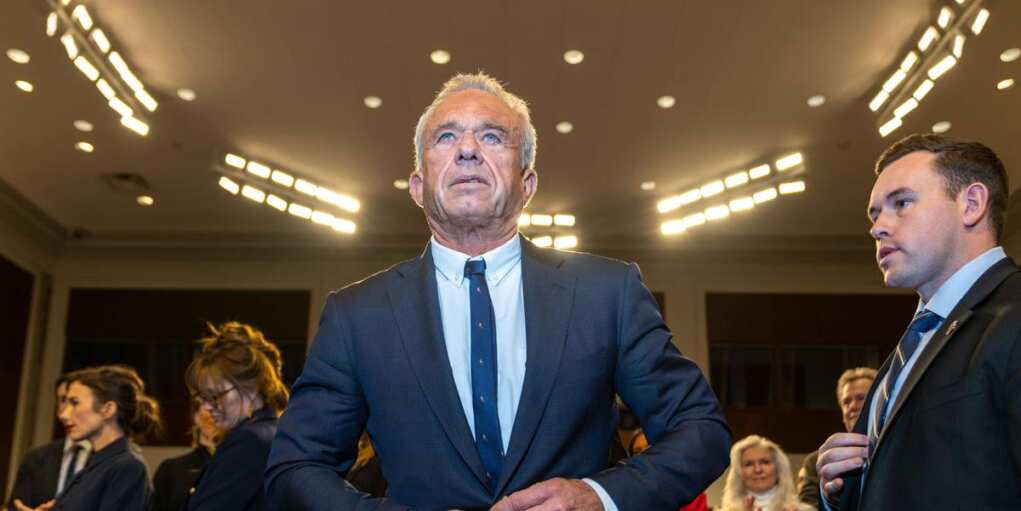RFK Jr. Declares War on ‘Taboo’ Health Issues—Big Pharma and Big Food Beware

Robert F. Kennedy Jr., the newly minted Secretary of Health and Human Services, is wasting no time shaking up the status quo. In his inaugural address to HHS staff, Kennedy made it abundantly clear: “Nothing is going to be off limits” in his mission to tackle America’s chronic disease epidemic. And by “nothing,” he means taking on the sacred cows of the pharmaceutical and food industries that have long enjoyed immunity from scrutiny.
Taking Aim at the Untouchables
Kennedy isn’t tiptoeing around the issues. He’s targeting areas that have been conveniently ignored or dismissed by the mainstream medical community and their corporate benefactors:
- Childhood Vaccine Schedule: For years, any questioning of the ever-expanding vaccine schedule has been met with cries of “anti-vaxxer.” Kennedy is demanding unbiased science to ensure safety and efficacy, free from pharmaceutical company influence.
- Electromagnetic Radiation: With the proliferation of wireless technology, concerns about EMF exposure have been brushed aside. Kennedy plans to investigate potential health impacts without the telecom industry’s interference.
- Glyphosate and Other Pesticides: Despite mounting evidence linking glyphosate to various health issues, it’s still widely used. Kennedy aims to scrutinize its safety and the cozy relationship between regulators and agrochemical giants.
- Ultra-Processed Foods and Artificial Additives: The food industry’s reliance on chemicals and additives has coincided with rising chronic diseases. Kennedy is set to challenge the FDA’s leniency and demand accountability.
- SSRIs and Psychiatric Drugs: The surge in antidepressant prescriptions raises questions about overmedication and pharmaceutical profits. Kennedy seeks to reevaluate their widespread use and long-term effects.
Restoring Trust Through Transparency
Kennedy emphasized that the erosion of public trust in health agencies stems from their entanglement with political and corporate interests. “Science gets politicized when power and profit are involved,” he stated, highlighting the need to reduce monetary influence to prioritize public health over profits.
A Nod to the Founding Fathers
Drawing inspiration from America’s founders, many of whom were “citizen scientists,” Kennedy underscored the nation’s legacy of inquiry and transparency. He invoked his uncle’s sentiment: “The word secrecy is repugnant to a free and open society,” reinforcing his commitment to openness in scientific research and policy-making.
The ‘Make America Healthy Again’ Commission
Central to Kennedy’s agenda is the establishment of the “Make America Healthy Again” (MAHA) Commission. This body will delve into the root causes of chronic diseases, examining factors like environmental toxins, dietary contributors, and the potential overreach of pharmaceutical interventions. By challenging entrenched interests, the commission aims to reverse the alarming trends in public health.
Facing the Naysayers
Unsurprisingly, Kennedy’s bold stance has ruffled feathers. Critics, particularly those with ties to Big Pharma and Big Ag, label his approach as “anti-science.” However, Kennedy counters that true science thrives on questioning and rigorous evaluation, not blind acceptance of industry-funded studies.
A Call to Action
Kennedy’s message to HHS employees and the American public is unequivocal: It’s time to prioritize health over profits, transparency over secrecy, and independent research over corporate-sponsored narratives. By confronting these “taboo” topics head-on, Kennedy is positioning himself as a champion for genuine public health reform, unafraid to challenge the powerful entities that have long dictated the nation’s health policies.
In an era where questioning the mainstream narrative often leads to vilification, RFK Jr.’s unwavering commitment to uncovering the truth offers a beacon of hope for those seeking a healthier, more transparent America.




